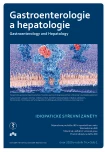-
Medical journals
- Career
Ustekinumab – a new biological therapy of ulcerative colitis
Authors: Lukáš M.
Authors‘ workplace: Klinické a výzkumné centrum pro idiopatické střevní záněty ISCARE a. s. a 1. LF UK, Praha
Published in: Gastroent Hepatol 2020; 74(1): 39-43
Category:
doi: https://doi.org/10.14735/amgh202039Overview
Based on the results of the UNIFI study, ustekinumab (UST) has been accepted into clinical practice for the therapy of moderate to severe ulcerative colitis in the Czech Republic since autumn 2019. This report describes the first anti-interleukine therapy in UC patients. In the UNIFI study, UST was shown to be a highly effective and safe therapy during the inductive and maintenance phases with side effects not different from those of the placebo. Previous failure of biologic therapy in a patient is a negative predictor of UST effectiveness, as observed with other monoclonal antibodies. UST therapy was associated with a prompt clinical response within the 2nd week of therapy and with a concomitant reduction in the levels of inflammatory surrogate markers. UST was also highly effective for endoscopic and histologic remission. The UNIFI study is the first randomized controlled trial of UST, which demonstrated its effectiveness as a biologic therapy in patients who had been previously exposed to vedolizumab therapy.
Conflict of Interest: The author declares that the article/ manuscript complies with ethical standards, patient anonymity has been respected, and he states that he has no financial, advisory or other com mercial interests in relation to the subject matter.
Publication Ethics: This article/manuscript has not been published or is currently be ing submitted for another review.
The author agrees to publish his name and e-mail in the published article/manuscript.
Dedication: The article/manuscript was created with the supported of Jans sen-Cilag s.r.o. company.
The Editorial Board declares that the manuscript met the ICMJE „uniform requirements“ for biomedical papers.
Keywords:
Ulcerative colitis – ustekinumab – biologic therapy – antiinterleukine therapy
Sources
1. Singh S, Allegretti JR, Siddique SM et al. AGA technical review on the management of moderate to severe ulcerative colitis. Gastroenterology 2020. In press. doi: 10.1053/j.gastro.2020.01. 007.
2. Lukáš M. Druhá generace biologické léčby: anti-inregriny a anti-integriny. In: Lukáš M (ed). Pokroky v diagnostice a léčbě idiopatických střevních zánětů. Praha: Galén 2019 : 290.
3. Sands SE, Sandborn WJ, Panaccione R et al. Ustekinumab as induction and maintenance therapy for ulcerative colitis. N Engl J Med 2019; 381 (13): 1201–1214. doi: 10.1056/NEJMoa 1900750.
4. Sandborn WJ, Sands BE, Panaccione R et al. Efficacy and safety of ustekinumab as maintenance therapy in ulcerative colitis: week 44 results from UNIFI. J Crohn’s Colitis 2019; 13 (Suppl 1): S25–S26. doi: 10.1093/ecco-jcc/jjy222. 034.
5. Li K, Friedman JR, Marano C et al. Effects of ustekinumab induction therapy on endoscopic and histological healing in the UNIFI Phase 3 study in ulcerative colitis. J Crohn’s Colitis 2019; 13 (Suppl 1): S73. doi: 10.1093/ ecco-jcc/jjy222.105.
6. Sands BE, Sandborn WJ, Panaccione R et al. Efficacy and safety of ustekinumab for ulcerative colitis through 2 years: UNIFI long-term extension. Presented at: UEGW, October 19th–23rd 2019, Barcelona.
7. Adedokun OJ, Xu Z, Marano C et al. Pharmacokinetics and exposure-response relationships of intravenously administered ustekinumab during induction treatment in patients with ulcerative colitis: results from the UNIFI induction study. J Crohn’s Colitis 2019; 13 (Suppl 1): S255–S256. doi: 10.1093/ecco-jcc/ jjy222.435.
Labels
Paediatric gastroenterology Gastroenterology and hepatology Medical genetics Surgery Reproduction medicine
Article was published inGastroenterology and Hepatology

2020 Issue 1-
All articles in this issue
- On the threshold of the next year and the anniversary of the Battle of White Mountain
- What is the cost of inflammatory bowel disease?
- Guidelines of the Slovak Work ing Group on IBD in SGS for the Treatment of IBD at Reproductive Age
- Telemedicine and inflammatory bowel disease – results of the IBD Assistant pilot project
- Direct costs for the treatment of inflammatory bowel diseases
- Ustekinumab – a new biological therapy of ulcerative colitis
- How to choose the right IBD patients for vedolizumab treatment
- Unexpected cause of death of patient with upper gastrointestinal bleeding
- Fecal microbiota transplantation – past, present, and future
- Glomerulopathies in patients with inflammatory bowel disease
- Part 7 – Time trends in the volume and proportion of different types of hospitalization of patients with IBD
- In memoriam: doc. MUDr. Václav Jirásek
- In memoriam: MUDr. Branislav Valach
- The selection from international journals
- Autodidaktický test: IBD
- Tofacitinib induction efficacy and safety in ulcerative colitis at week 8 – results from clinical practice
- Novel Large Bowel Developments prof. Jaroslaw Regula – Gastro Update Europe 2019, Budapest
- Small bowel diseases and infections prof. Gerhard Rogler – Gastro Update Europe 2019, Budapest
- Gastroenterology and Hepatology
- Journal archive
- Current issue
- Online only
- About the journal
Most read in this issue- Fecal microbiota transplantation – past, present, and future
- Ustekinumab – a new biological therapy of ulcerative colitis
- Unexpected cause of death of patient with upper gastrointestinal bleeding
- Telemedicine and inflammatory bowel disease – results of the IBD Assistant pilot project
Login#ADS_BOTTOM_SCRIPTS#Forgotten passwordEnter the email address that you registered with. We will send you instructions on how to set a new password.
- Career

